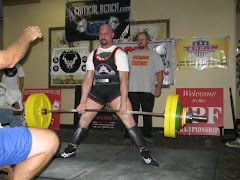Rhythmic Rest & Mental Toughness in Training
One of the biggest factors limiting my own conditioning progress over the years has been the perceived need for more rest during fast-paced training. This has been remedied in my own training and has meant a marked improvement in my overall abilities.
During me earlier years of military service, going beyond what I thought I could do was a given and expected of me. As an Airborne soldier, "All the way, and then some!" was our motto.
Having a tough, experienced NCOs demanding this of me helped a lot. Having my fellow Paratroopers with me was a huge motivating factor also.
Now years later, much of my training is done in between training my clients, and almost always by myself. On my heaviest lifting days, rest is not a problem.
CrossFit really empasizes strong basic heavy lifts, such as squats, deadlifts, etc.The pace is not fast, and there is plenty of time to recover between sets.
However, on days we really fast-paced circuits (known in the CrossFit world as "metcon", or metabolic conditioning workouts) things get really tough very quickly.
Example 1:
Do five rounds for your best time of
800 meter run
30 reps kettlebell swings (2 pood/70lb)
30 reps pullups
per round
example 2:
Do 100 reps each for your best time of:
pullups
pushups
situps
squats
Since there is no warning on what is coming the next training day, we have to adjust rapidly, no matter what they throw at us. I have been constantly challenged by this training strategy, and have made good solid measureable progress since I began CrossFit in 2005.
Getting good times on the metcon workouts has been difficult for me (finishing a metcon workout is an accomplishment in itself). I know I am not alone in that. Factors were identified that needed to change, and those changes made a big difference.
When you feel like you're just not getting enough oxygen, your body feels like it weighs 1000lbs, and your moving through waist-deep mud, your mental toughness has to kick in. If it doesn't, you're done.
As you push yourself to operate on less and less rest time during rounds or sets, your body and mind begin to adapt. After a while, you need less rest during these times, and your performance improves also. It is very rewarding when you see these changes in your own training. Doing what seemed almost impossble a few months earlier, will help you to improve even more in this.
It's learning your own rhythm in training, or developing rhythmic rest, even though you're moving at full-throttle.
Much has to do with your mindset. You have determined that you will relentlessy pursue this task until it's done, period!
Your body will adapt if you don't give it the opportunity to quit.
Yes, I know we all have to be mindful of medical emergencies, that is true. However, many people stop way too early; they could have done more. They could have moved faster, longer and with better technique if they had removed the mental barriers they had put in place.
I've had the good fortune of learning from a number of excellent coaches/trainers over the years.
Coach Glassman, Mike Mahler, Jeff Martone, Dave Schmitz, Bud Jeffries, Rich Lansky, Tom MItchell I've been blessed to learn from in person. Others I've received a lot of help from through their excellent training resources like Zach Even-Esh, Diesel Crew, and more.
All of these people excel in what they do, and how they train others. All of them know how train with extreme diligence even when they train alone (or should I say, especially when they train alone).
Getting back to my original point, in closing, it is vital to learn your own training rhythm. You probably don't need nearly the amount of recovery time you thought you did. Your body can do more than you've asked it to.
Let me illustrate this by paraphrasing NAS Master Heavyweight Strongman, Tom Mithcell. Tom said most people could be this strong, but they just won't do the work.
He said you had to go where you were afraid to go in the past. When I spoke with Tom the last time, he was ranked number one in the USA in his division.
Demand more from yourself, both menatlly and physically, and you'll go where you were afraid to go also, I did.
CrossFit Gulf Coast, 501 N.Beneva Rd. #600, Sarasota, FL 34232, USA




























2 comments:
This is a great article. I find "metcon" workouts to be the hardest. I also need to work on making my times better. I guess a little mental workout will be in order.
Hey Joe,
Hope you had a nice holiday vacation away. Hope you're ready for Monday. Time to get back to work.
CF style.
Post a Comment